Goldenhand Read online
Page 14
Nick watched as Lirael went over to the corner of the gate and opened a small sally port there, leaning close to use a key or perhaps a spell; he couldn’t see clearly as her back was to him. She vanished inside, and the sally port closed behind her.
He felt very alone all of a sudden, and damp and uncomfortable, and tired and weak, and wondered if he had done the right thing. But at the same time he was thinking about Lirael’s words.
“I wanted to.” Nick repeated her words to himself. She had wanted to come and get him. For her own sake? As a favor to Sam? Was she one of those people who just said nice things without meaning them? He didn’t think so, she seemed quite serious. He liked that, but it was hard to be sure of her true feelings on such a short acquaintance.
He must look a complete joke to her at the moment, he thought. A scrawny, pallid wreck in a borrowed cloak, shivering away with a red nose that was beginning to drip. A far cry from how he had imagined returning to the Old Kingdom.
Or how he had imagined it would be to meet Lirael again.
Nick wiped his nose with the edge of the cloak and looked back at the sally port. It remained stubbornly closed. The cloud was closing around the landing ledge again, reknitting itself into a solid expanse of white flecked with black streaks, and it was beginning to snow again. Wet, slushy snow.
After ten minutes, though it felt much longer to Nick, he grew tired of waiting. Clutching his cloak together at the front, he laboriously climbed out of the cockpit, gasping at the savage impact of the cold as he left the protective magic. His breath puffed out immediately like smoke, and the wetness on the end of his nose felt like it had been suddenly snap-frozen. His shoes, now bereft of laces, were loose on his feet and let in snow at the sides, which melted at once on what had been up until that moment his relatively warm feet.
Nick crept to the sally port, thinking to knock on it. But he had barely gone more than a few paces from the paperwing when there was a flash of light under the thin layer of snow ahead, as if hundreds of the magnesium flares photographers used had suddenly fired off, without the usual puffs of white smoke. Nick stopped and peered at the ground ahead. There were golden lights moving about under the snow there, tracing a picture, as if some huge unseen hand were painting in lines of sunshine.
He was still staring when the lines all came together at once, there was another even more blinding flash, and when his vision cleared save for several dancing black spots, there was a giant worm between him and the gate.
A worm easily seventy feet long and twelve feet in diameter, with a mouth of that same disturbingly wide diameter occupying all of the end closest to him, a mouth completely ringed with six serried layers of different-sized teeth, from enormous grinding molars at the back to tiny, delicate flesh-rending pointy ones at the front. Thousands of teeth, each the size and shape of a murderous small knife.
Nick gulped and stumbled back several steps to stand next to the paperwing, which he hoped might lend him some protection, as his mind furiously tried to come to terms with the sudden appearance of this vast monster.
The worm reared up at the front, its middle segments scrunching together, but it did not pursue him, nor make any move elsewhere. Its whole posture, if a giant worm could be said to have a posture, was that of a watchful sentry.
It was guarding the gate, Nick realized. He really hoped that also meant it would not attack him unless he tried to go closer.
He was feeling very slightly relieved about this when he heard the faintest sound behind him. Half turning, he found the very sharp point of a sword near his throat, and his cloak gaped open again from the speed of his spinning about. He started to pull it closed, but stopped as the sword touched his skin.
“Stay still!” commanded the woman who held the sword, which was glowing with Charter marks, warm and bright upon the cold steel blade. She was dressed entirely in white to match the snow, a thickly bundled figure with a hooded cloak showing a few errant strands of very pale blond hair, deep brown skin, and bright blue eyes under the green glass goggles which she had slid up on her forehead. Another brown-skinned, blue-eyed blond woman, also dressed in white furs over armor, stood nearby with an arrow nocked on a short bow. The point of the arrow was aimed at Nick’s head, though she had not actually drawn back the bowstring.
“I am a guest,” said Nick, trying very much to be the First Minister of Ancelstierre’s nephew, even standing bare naked under a rather gaping cloak. He remained very still. The sword point was just pricking the skin of his windpipe, and it was as sharp as any razor he had ever used. “Or so I have been assured.”
“Is that so—” the swordswoman started to say, but she was interrupted by the sudden return of Lirael, who was trying to come out of the sally port. Finding it would only open halfway because of the worm, she put her head out, looked at the huge creature that had taken up residence in front of the greater part of the gate, and stamped her foot much as Nick might do when one of the dogs at home tried to come in where it wasn’t allowed.
“Shoo!” said Lirael, waving her golden hand.
The worm flexed itself back far enough to allow her to open the lesser door and she came striding out toward the paperwing. “What is going on? Lower your sword at once!”
“Who are you?” asked the swordswoman. She did not lower her sword, and the archer with her transferred her aim to Lirael.
“The Abhorsen-in-Waiting! As you can see very well from my surcoat, bells, and the royal paperwing right in front of your eyes, Calleset!”
The sword did go down this time, rather waveringly, and the archer lowered her bow.
“Lirael?” asked Calleset. She stepped away from Nick, who took the opportunity to wrap his cloak back around himself and look nervously at the giant worm. It remained by the gate, which was only slightly comforting, as its rows of teeth were rotating, each layer moving in a contrary direction to the next.
“There is only one Abhorsen-in-Waiting, isn’t there?” commented Lirael testily. “Why isn’t the gate open? And I would have expected someone from the Watch up here to meet me!”
Calleset looked at her, openmouthed, then mumbled something about “having gotten taller.”
“Well, where is everybody?” asked Lirael. She gestured at the archer. “Lower your bow before you have an accident. Jelesray, isn’t it? I didn’t know you were in the Rangers.”
“I . . . I just joined three months ago,” said Jelesray haltingly. She was much younger than Calleset, perhaps seventeen to the latter’s early twenties.
“I’m sorry, Lirael,” said Calleset stiffly. “I was just surprised. I’ve never heard you talk so much. You never did before. We used to call you Chatterbox, remember?”
“No,” said Lirael. She was surprised to have had any nickname at all, particularly from someone older like Calleset. It all seemed so long ago, her life as a Clayr. Or as she had always thought, not really a Clayr, since she didn’t have the Sight. “Did you?”
“Um, well, some people did,” said Calleset, suddenly recalling that Lirael was no longer a very shy and retiring Second Assistant Librarian but the Abhorsen-in-Waiting, and not only that, but a great hero of the Kingdom.
“Why isn’t the gate open?” asked Lirael. “Has something happened? All the Watch busy, and only two rangers available to meet me and my guest?”
She indicated Nick, who was nervously watching the worm, still with a certain amount of disbelief and a great deal of caution. He was trying to work out where to run if it suddenly lunged forward with that vast mouth and all those teeth. Lirael was very trusting to turn her back to such a thing . . .
“Who I should say is Nicholas Sayre, a . . . a prince from Ancelstierre,” continued Lirael. “Or as good as, his uncle being their ruler—”
“That’s not quite right,” interrupted Nick. He still didn’t take his eyes off the worm. “Technically the Hereditary Arbiter is the head of state; he’s my cousin. Uncle Edward is the Chief Minister—”
“So
I would have thought someone from the Watch could be here to greet him at least, even if everyone just thinks I am still the same old Lirael!”
“I don’t think anyone thinks that,” blurted out Calleset. “It’s . . . it is just that we . . . they . . . the Nine Day Watch didn’t See you.”
“Oh,” replied Lirael.
The Clayr always Saw visitors, even if they missed other things. But set against that certainty there was also the case that she herself had never been Seen by the Watch when she was growing up, even when the normal Nine Day Watch of forty-nine Clayr was reinforced to the rare Fifteen Hundred and Sixty-Eight Clayr, all concentrating their power in an attempt to distill the myriad possible futures into a mere several that could be Seen clearly in the ice of the Observatory.
The Watch had in fact only Seen Lirael once, at the very last moment, when the action against Orannis was critical. Lirael had thought that from then on the Clayr would See her as much as they Saw everyone else. But perhaps not . . .
“There is also the . . . the Starmount Guardian,” added Calleset, indicating the giant worm arrayed in front of the gate. “We came from the next post up the mountainside when the alarm sounded, indicating the guardian was active. It only comes out when danger threatens, or enemies are without the gate.”
“It c-c-ame out of the g-g-ground when I walked t-t-toward the little d-d-door,” said Nick. His teeth were chattering from the cold now, much as he tried to keep them still. “Is it . . . um . . . r-r-real?”
“It’s a guard Sending,” said Lirael. “Made of Charter Magic. Real enough, if you had to fight it, though I have to say whoever made it—a long time ago—got the teeth wrong. Real drill-grubs don’t have pointy teeth in the front ring, or pointy teeth at all, for that matter. But we need to get you in out of the cold. Come on!”
Lirael took Nick by the arm and began to lead him toward the gate. But as they approached, the great worm reared up before them, its teeth rotated faster, and gobbets of purple slime began to drip from its mouth.
“Drill-grubs don’t drool. That is pure invention,” said Lirael crossly, but she stopped as Nick flinched back. “However, it does seem to be triggered by your presence, Nick.”
“We can’t let anyone in whom the Starmount Guardian refuses,” said Calleset uneasily. She pulled a small leather-bound book from the pouch on her belt and flicked it open. “That’s rule thirty-six: ‘Should the Starmount Worm, the Sunfall Lion, or’—well, there are others I shouldn’t mention—it says, ‘appear of their own volition, then look to your swords and bar entry to those the guardians scorn.’”
“Scorn?” asked Nick.
“It’s old-fashioned,” said Lirael hurriedly. “It just means keep out.”
Calleset put the book away and stood at attention with her chin up, which unfortunately did nothing to counter her general air of uncertainty.
“So . . . um . . . we can’t let your guest in. Even if he is a prince from over the Wall. I’m sorry.”
“Because of rule thirty-six,” said Lirael. “And you have to follow the rules.”
“Yes,” said Calleset.
Lirael looked at the guard Sending and thought for a moment. She could probably send it away with a spell, or disable it, but this would only create more problems. Two young rangers would never go against their rules and regulations. They might even feel they had to fight her. . . . Lirael felt suddenly ill at the thought of fighting her kin, and hastily dismissed any notion of forcing her way in.
“I presume more rangers will be on their way, from the other posts on the mountain and from inside? Someone of higher rank?”
“Yes,” said Calleset. “The alarm will have sounded everywhere.”
“So we can expect Mirelle or some other officer who can send the guardian back to rest fairly soon?”
Mirelle was the commander of the Rangers, those Clayr who patrolled the glacier, the mountains, and the river valley, and who also guarded the outer gates.
“Maybe just a lieutenant,” said Calleset. The expression on her face suggested that she hoped it was not the commander herself who would show up. “Qilla’s the closest on duty, up here.”
“Qilla got made a lieutenant of the Rangers?”
Qilla was only five or six years older than Lirael, very young to be promoted so high. A lieutenancy in the Rangers was the equivalent of a First Assistant Librarian. Not that ranks in the various employments of the Clayr were considered all that important by the inhabitants of the Glacier; everything was subsidiary to their main task of Seeing the future, or trying to make sense of the many possible futures they Saw.
“Acting lieutenant,” said Calleset, then shut her mouth as if she had said too much.
“We’d better wait for her, then,” said Lirael. “But could Jelesray please go inside and fetch some of the paperwing flyer’s furs for Nicholas? If that isn’t against the rules?”
Calleset inclined her head at the younger ranger, who quickly ran to the sally port. Nick noticed that she went as far around the worm as she could, obviously not really believing it knew the difference between those who should be allowed in and those who should not. He was relieved to see he was not the only person there who found the drill-grub Sending frightening. He wished he could be as uncaring about it as Lirael, who had barely spared the giant worm a glance after she had first shooed it away from the gate.
“Perhaps I should explain that Nicholas was involved in the binding of Orannis,” said Lirael. “And from that, carries the taint of Free Magic in his blood and bone. I suspect that is what the worm reacts to; that kind of Sending is generally not very discerning.”
“Or it simply doesn’t l-l-like my face,” said Nick, attempting a joke, which fell flat, as Lirael and Calleset both looked puzzled.
“Drill-grubs are blind,” said Lirael, after a moment. “They sense vibrations. Though this Sending may have been given other senses in its creation, you can see it has no eyes.”
“Yes,” mumbled Nick, teeth chattering. He felt even more miserable now. “How s-s-silly of me.”
Chapter Seventeen
LOOSE SHALE AND CHARTER-SPELLED ARROWS
Near Yellowsands, the Old Kingdom
The first wood-weird came scuttling over the Charter Stone hill a little less than thirty minutes after Ferin had parted company with the main body of villagers. It skirted around the stone, keeping well clear. This particular Free Magic construct was long and low, rather like a cockroach or spider in shape, one made from a rough-hewn hickory trunk and branches, trailing strips of partially sloughed-off bark. The creature had eight legs made from tree roots, joined in multiple segments. Free Magic fire burned at the joints, and also in the eyes and mouth that had been gouged in the end of its central trunk with auger and adze.
It was very quick, faster than any wood-weird Ferin had seen before, as swift as a galloping horse, though it moved in a series of long lunges, with short pauses in between. Well ahead of its fellows, it got down into the valley within a few minutes. There it continued its horrible speedy, scuttling movement: rushing forward, stopping for a moment as if to test the air, then rushing forward again.
Ferin and her companions were a little more than halfway up the shale hill, the ridgeline looming above them. They stopped to look down, and there was a collective pause in everyone’s breath as the wood-weird did not turn aside to follow their path, but continued down the road, following the fleeing villagers. The last dozen or so of the fisher-folk were still in sight, well short of where the road turned behind the southern hill toward the estuary and the tower.
The wood-weird would catch the stragglers in ten minutes at the most, though these last villagers had seen it too, and were now running rather than walking. But there was no way they could escape such a swiftly moving creature.
More wood-weirds appeared on the crest of the village hill, again giving the Charter Stone a wide berth. These were like the one that had attacked Ferin at the Bridge Castle: tall monsters of fir an
d spruce and ironwood, timbers greatly valued on the steppe, where all trees were rare.
Once again, Ferin wondered at the profligate use of the wood-weirds so far from the steppe. The cost in sorcerers, keepers, and rare timber was extreme. She had said the raider must carry the sorcerous strength of two clans at least, but perhaps it was nearer three or even four clans working in concert, at the behest of the Witch With No Face. Her own Athask people had only two shamans and three witches, and of them, only the most senior could create a wood-weird. It took years to make the body, carving the timber and infusing it with spells, preparing it for habitation by a powerful enough Free Magic spirit, which had to be gotten from wherever the sorcerers found such things.
“Charter, please make it turn aside and follow us,” whispered Swinther, his words echoed by Young Laska. The woodcutter was not looking at the slower creatures marching down the Charter Stone hill, only at the spiderlike, eight-legged wood-weird on the road below, which drew closer and closer to the rear guard of the fisher-folk. If you could call it a rear guard, since in terms of effective fighters it consisted only of Constable Megril and Astilaran, the former kicking a well-known dockside lounger along in an effort to make him run faster.
“Can we draw the creature’s attention?” asked Ferin. “With some of your magic?”
“Yes,” replied Young Laska. She smiled a wry smile. “I am more used to trying to conceal myself from such things. But there is a signal we use . . .”
She bent her head and held her hands cupped near her mouth, a look of intense concentration in her eyes. The Borderer blew out a tiny breath, and Ferin watched in fascination as glowing marks tumbled from Young Laska’s lips and gathered in her hands, winding together like a tiny serpent, the head gripping the tail. She took another breath, deeper this time, laid her hands flat, and blew the spinning circle of marks out into the air. Rather than tumbling down the hillside, the glowing ring shot up into the sky and a second later exploded into dozens and dozens of brilliant small stars that fell a dozen feet before disappearing with attendant thunderclaps, not loud and close, but as if from a far-off storm.

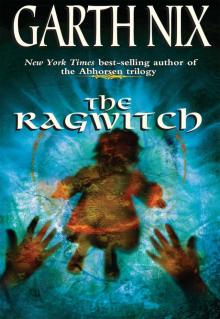 The Ragwitch
The Ragwitch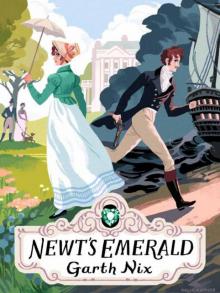 Newt's Emerald
Newt's Emerald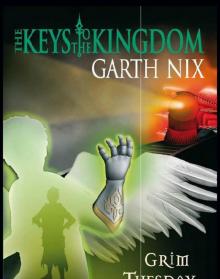 Grim Tuesday
Grim Tuesday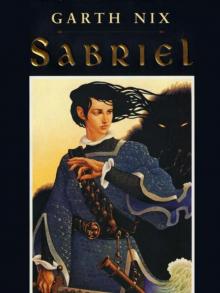 Sabriel
Sabriel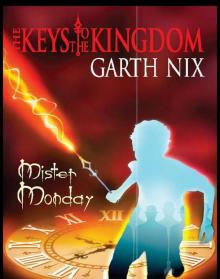 Mister Monday
Mister Monday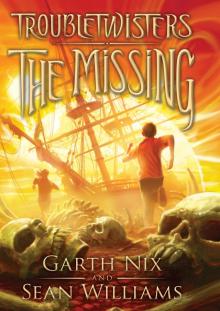 The Missing
The Missing The Fall
The Fall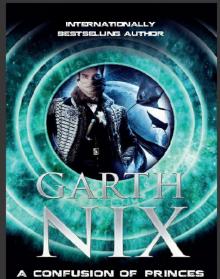 A Confusion of Princes
A Confusion of Princes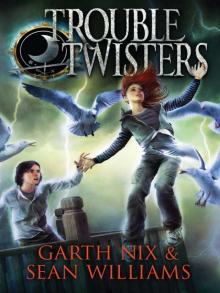 Troubletwisters
Troubletwisters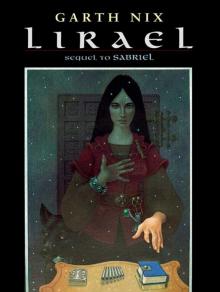 Lirael
Lirael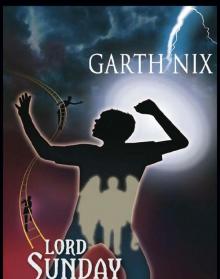 Lord Sunday
Lord Sunday Clariel
Clariel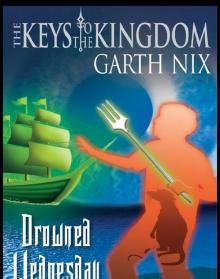 Drowned Wednesday
Drowned Wednesday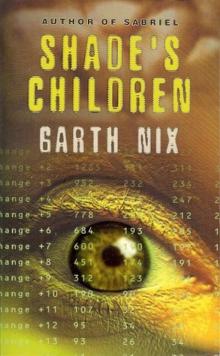 Shade's Children
Shade's Children The Violet Keystone
The Violet Keystone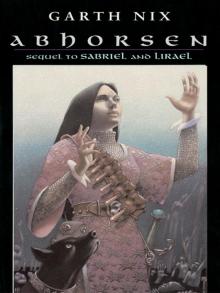 Abhorsen
Abhorsen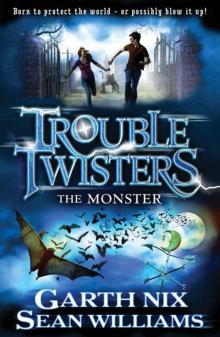 The Monster
The Monster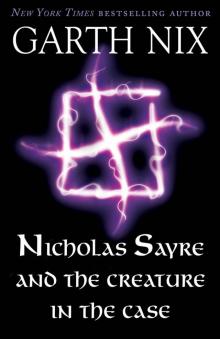 The Creature in the Case
The Creature in the Case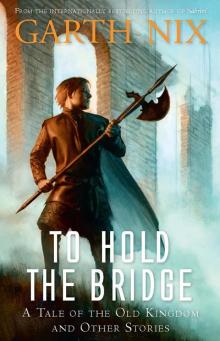 To Hold the Bridge
To Hold the Bridge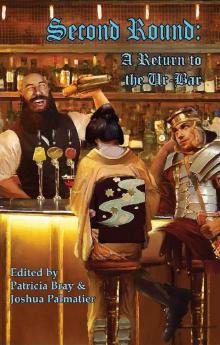 Second Round: A Return to the Ur-Bar
Second Round: A Return to the Ur-Bar Above the Veil
Above the Veil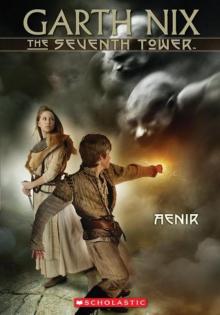 Aenir
Aenir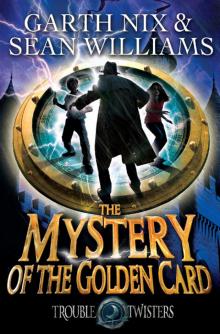 Mystery of the Golden Card
Mystery of the Golden Card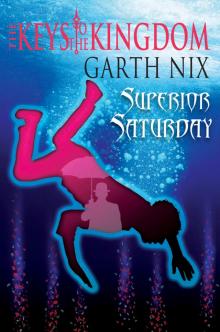 Superior Saturday
Superior Saturday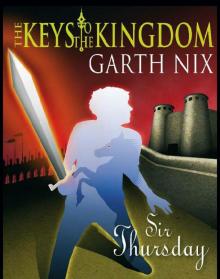 Sir Thursday
Sir Thursday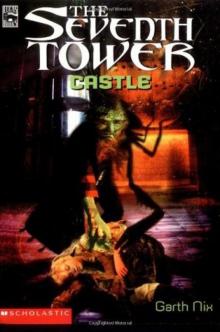 Castle
Castle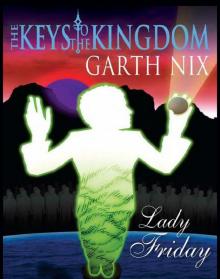 Lady Friday
Lady Friday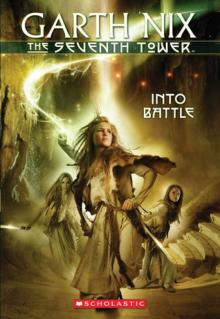 Into Battle
Into Battle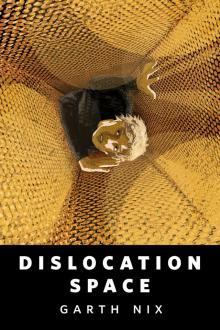 Dislocation Space
Dislocation Space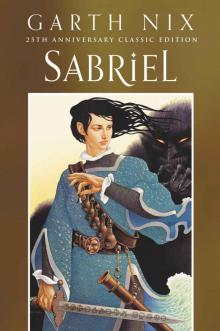 Sabriel (Old Kingdom Book 1)
Sabriel (Old Kingdom Book 1)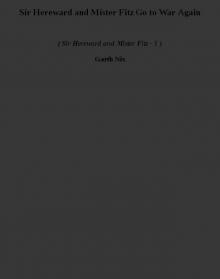 Sir Hereward and Mister Fitz Go to War Again shamf-1
Sir Hereward and Mister Fitz Go to War Again shamf-1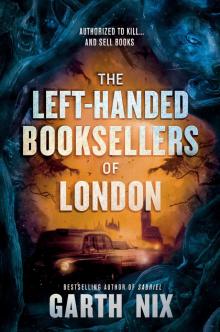 The Left-Handed Booksellers of London
The Left-Handed Booksellers of London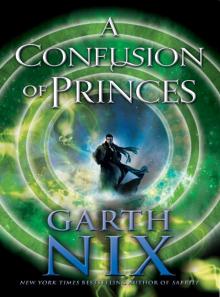 Novel - A Confusion of Princes
Novel - A Confusion of Princes One Beastly Beast
One Beastly Beast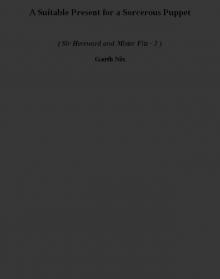 A Suitable Present for a Sorcerous Puppet shamf-3
A Suitable Present for a Sorcerous Puppet shamf-3 Beyond the Sea Gates of the Scholar Pirates of Sarsköe shamf-2
Beyond the Sea Gates of the Scholar Pirates of Sarsköe shamf-2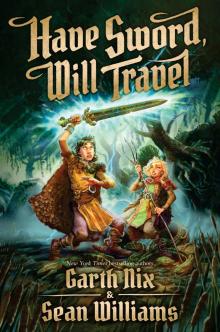 Have Sword, Will Travel
Have Sword, Will Travel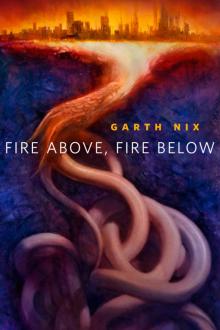 Fire Above, Fire Below
Fire Above, Fire Below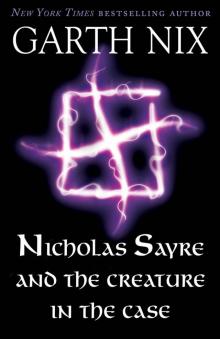 Nicholas Sayre and the Creature in the Case
Nicholas Sayre and the Creature in the Case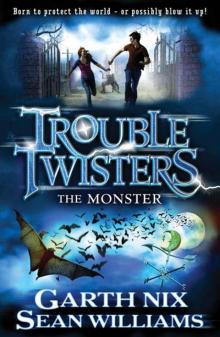 The Monster (Troubletwisters)
The Monster (Troubletwisters)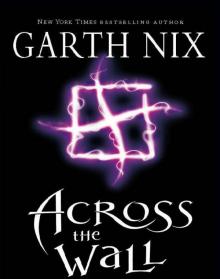 Across the Wall
Across the Wall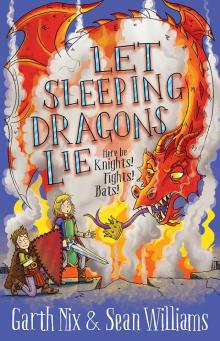 Let Sleeping Dragons Lie
Let Sleeping Dragons Lie![[Abhorsen 03a] - Across the Wall Read online](http://i1.bookreadfree.com/i2/04/12/abhorsen_03a_-_across_the_wall_preview.jpg) [Abhorsen 03a] - Across the Wall
[Abhorsen 03a] - Across the Wall